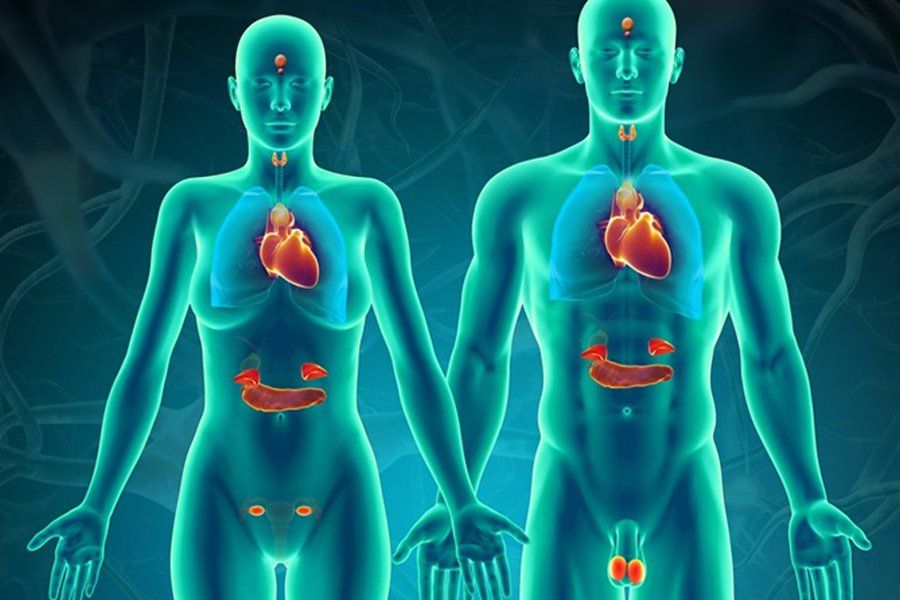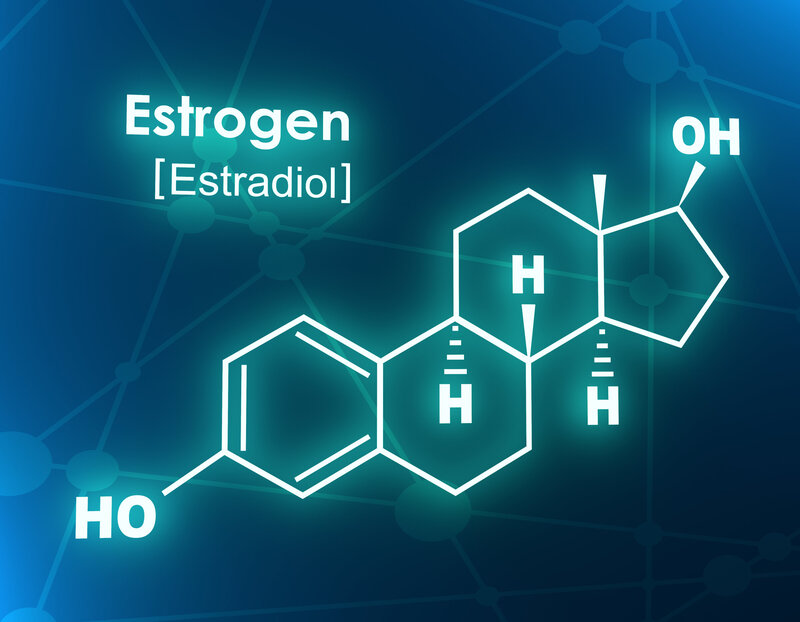Editor’s Note: In our last blog post, we explored the balancing your gut-brain connection to further enhance your vitality. This week, we turn our focus to achieving hormonal harmony—a foundational element in women’s health—based on insights from my book Create The Vitality You Crave: Epigenetics 101 to Unlock Your Healing Power.
Hormones serve as the unseen architects of our physical, emotional, and mental health, influencing every aspect of our well-being—from our moods and metabolic processes to reproductive functions and beyond. As Dr. Anna Cabeca wisely notes, “Hormones are the key to everything in women’s health. They are the foundation of our physical, emotional, and mental well-being.” When these vital messengers are in harmony, we thrive with vitality and wellness. Yet, even the slightest imbalance can throw our system into disarray, resulting in a range of symptoms and health issues. By gaining insight into the endocrine system and implementing proactive measures to restore balance, we can take charge of our health and enhance our overall well-being.
In this post, we will explore the foundational elements of hormonal health, emphasizing the critical need for balance within the endocrine system, the effects of stress on hormone levels, and the importance of regular monitoring. With this knowledge at your fingertips, you’ll be equipped to navigate the intricate landscape of hormonal fluctuations and foster a state of harmony that empowers your vibrant life.
Understanding Your Endocrine System
Imagine a symphony orchestra where each musician plays their unique instrument to create beautiful harmony. The conductor ensures every instrumentalist comes in on cue, resulting in a perfect melody. When the timing and pitch are off, the music turns into a discordant mess. Similarly, our bodies rely on the endocrine system to function harmoniously. When our hormones are balanced, we feel great. But when they’re out of sync, it disrupts the harmony of our health.
The endocrine system, our body’s control center, uses hormones as messengers to regulate various functions. There are over 200 hormones or hormone-like substances in the body, but some of the most well-known include:
- Thyroid hormones
- Insulin
- Serotonin
- Progesterone
- Estrogens (estradiol, estriol, and estrone)
- Testosterone and/or androgens
- Cortisol
These hormones, produced by glands like the thyroid, adrenal glands, and pancreas, travel through the bloodstream to target organs and tissues. They regulate processes such as metabolism, growth, reproduction, mood, and hunger. Think of hormones as messengers telling your body what to do and when. For example, the thyroid gland produces hormones that control metabolism, while the adrenal glands produce hormones to help you manage stress. The pancreas releases insulin to regulate blood sugar levels. Overall, the endocrine system keeps your body balanced and functioning properly, ensuring everything runs smoothly.

The Importance of Balance
Just like a water filter needs to be cleaned to function properly, our endocrine system requires detoxification to avoid getting clogged up. Imagine your endocrine system as a lock and key mechanism at the cellular level. Many biochemical processes depend on this system. If our receptor sites are clogged with toxins (like a rusty old padlock), the key (hormone or biochemical cofactor/nutrient) may not fit properly. Conversely, harmful substances (hormone mimickers or endocrine disruptors) can also block these sites, leading to imbalances.
When hormones are out of balance, everything becomes harder—thinking, social interactions, staying grounded, avoiding comfort foods, and more. Sex hormones impact nearly every area of your body. An imbalance can lead to gut issues, hormone-related cancers, brain function problems, hair and nail growth issues, visceral fat accumulation, obesity, and low libido. Chronic stress and elevated cortisol further exacerbate these problems.
Hormonal Days and Nights
“Hormonal days” typically refer to the fluctuations of sex hormones such as estrogens, progesterone, and testosterone, which play a crucial role in regulating various bodily functions, including menstruation, pregnancy, brain function, breast and bone health, heart health, and menopause. Symptoms of hormonal imbalances, such as PMS, morning sickness, acne, brain fog, bloating, hot flashes, insomnia, and mood swings, serve as important signals or “dashboard lights” indicating potential issues within the endocrine system. Being mindful of these symptoms is essential for achieving overall vitality, as it allows individuals to recognize and address hormonal imbalances before they lead to more serious health concerns.
Balancing Yin and Yang Energy
The balance of yin and yang, representing feminine and masculine energies, is essential for health. Men typically embody yang energy, driven by higher testosterone levels that support strength, protection, and assertiveness. Conversely, women align with yin energy but may rely on cortisol during stress to manage demands. While cortisol serves short-term needs, chronic stress elevates cortisol levels and increases the demand for progesterone, disrupting the balance between estrogen and progesterone. This imbalance can negatively impact mood, energy, and overall well-being, highlighting the importance of harmony between these energies for optimal functioning.
Stress and Hormonal Imbalance
Stress significantly affects hormonal balance by initiating a chain reaction that elevates cortisol levels in the body. When stress occurs, the hypothalamus signals the pituitary gland to release adrenocorticotropic hormone (ACTH), which then prompts the adrenal glands to produce cortisol. This process can deplete progesterone, a vital hormone, leading to a phenomenon known as “progesterone steal.” As a result, the imbalance between cortisol and progesterone can lead to various health challenges, including anxiety, fatigue, and irregular menstrual cycles.

Estrogen Dominance
Estrogen dominance occurs when there’s an imbalance between estrogen and progesterone, often due to stress, diet, synthetic hormones, and exposure to xenoestrogens (fake synthetic toxic estrogens). Symptoms include anxiety, bloating, brain fog, breast tenderness, constipation, acne, depression, fatigue, fibroids, hair loss, headaches, heavy bleeding, insomnia, irregular periods, low libido, mood swings, PMS, water retention, and weight gain.
Restoring Your Hormonal Balance
- Manage Your Stress
- Practice deep breathing exercises: Utilize moments throughout your day to take slow, deep abdominal breaths. This can be integrated into your routine, such as using screen-saving time to breathe deeply every fifteen to thirty minutes.
- Monitor Your Heart Rate Variability (HRV):
- Elite HRV: This app trains you with biofeedback to improve your breathing, enhance calm states, decrease your Sympathetic Nervous System (SNS) response, increase your Parasympathetic (PSNS) Nervous System response, and raise your HRV score.
- OURA ring: This device helps monitor your HRV. Ensure the Bluetooth is turned off when wearing it to avoid constant EMF exposure. The ring tracks your data regardless of the Bluetooth capacity.
- Enjoy Lime and Clove Essential Oils:
- Put one drop of each oil in the palm of your hand. Combine them by rubbing in a clockwise position, then rub the combined oils down both sides of your neck under your ear, along your Vagus nerve. This will decrease your SNS (stress nervous system) and increase your PSNS (pretty safe nervous system).
- Practice Yoga: Yoga supports breath work, which increases PSNS activity. It’s an effective way to decrease cortisol levels.
- Use CBD Oil: Joy Organics is a highly recommended brand for CBD oil.
- Avoid Toxins
- Examine your fridge, pantry, and yard care to find hidden sources of toxins as part of your environmental cleanse. Replace one toxic food with a live, healthy organic choice.
- Refer to the Environmental Working Group (EWG): Provides resources to check all products for toxic load and choose healthier alternatives. Refer to the “Dirty Dozen” and “Clean Fifteen.”
- Use Skin Deep: A subsidiary of EWG, offers a database to assess the toxic load of personal care products.
- Increase Your Greens
Healthy greens are essential for the steroid (sex hormone) pathway, which involves over 45 biochemical conversions. Increase your intake of greens and veggies, especially cruciferous veggies like cabbage, kale, broccoli, Brussels sprouts, and cauliflower.
Understanding the Importance of Estrogen
As women age, maintaining optimal estrogen levels is crucial for overall health and well-being. While there are concerns about estrogen’s link to breast cancer, it is essential to differentiate between natural estrogen and synthetic, man-made estrogens that can pose health risks. Dr. Jennifer Simmons, a former breast cancer surgeon, clarifies that it is not estrogen itself that causes breast cancer; rather, it is the decline in estrogen levels that occurs as women reach menopause that may contribute to an increased risk of this disease. The narrative that links estrogen to breast cancer is often influenced by pharmaceutical interests promoting drugs aimed at blocking estrogen synthesis.

Exploring Bioidentical Hormone Replacement Therapy
Bioidentical hormone replacement therapy (BHRT) offers a natural approach to managing hormonal changes during perimenopause and menopause. These hormones are chemically identical to those produced by the body and derived from plant sources, making them a more compatible option for treatment. BHRT is available in various forms, including pills, gels, and injections, facilitating ease of use and adherence to therapy. It can significantly alleviate moderate-to-severe menopausal symptoms and may also lower the risks of conditions such as diabetes, tooth loss, and cataracts while enhancing skin hydration, thickness, and elasticity. Additionally, BHRT can benefit post-treatment cancer patients with diminished estrogen levels by improving overall well-being and relieving symptoms like migraines and insomnia. However, it’s crucial to note that compounded bioidentical hormones, which are tailored to individual needs and made by pharmacies, are not FDA-approved, raising concerns about their safety and quality. Clinicians should exercise caution when prescribing these custom formulations to ensure patient safety.
Monitoring Your Hormone Levels and Optimizing Your Hormone Metabolism
Optimizing your hormone metabolism is a crucial aspect of health that is often overlooked in Western medicine, particularly in understanding how hormones, especially estrogen, are processed in the body. This process ensures that hormones are effectively utilized and eliminated, maintaining hormonal balance and overall well-being. Xenoestrogens—synthetic compounds that mimic estrogen—can disrupt normal hormonal functions and negatively affect the BRCA genes, which are essential for preventing breast cancer. When xenoestrogens alter DNA expression, they increase the risk of hormone-related cancers, highlighting the need to monitor and manage environmental exposures. By prioritizing hormone metabolism and reducing exposure to these harmful substances, individuals can take proactive steps to enhance their hormonal health and mitigate potential health risks.
Monitoring your hormone levels and metabolism is essential for maintaining hormonal balance and overall health. The DUTCH test (Dried Urine Testing for Comprehensive Hormones) stands out as a valuable tool in this regard, as it provides detailed insights into hormone levels and their metabolism, often surpassing the information gleaned from traditional blood tests. This comprehensive assessment also sheds light on adrenal gland function and the significant impact of cortisol on hormonal equilibrium, helping individuals understand the interconnectedness of their endocrine health. Renowned hormone and wellness expert Dr. Tara Scott advocates for women to undergo the DUTCH test at pivotal ages—25, 35, 45, and 55—to facilitate proactive and thorough monitoring of hormonal health.
By tracking hormone levels throughout key stages of life, women can make informed decisions about lifestyle changes, interventions, or therapies needed to maintain optimal hormonal balance. This level of monitoring empowers women to address imbalances early, promoting better health outcomes and enhancing overall well-being as they navigate the complexities of hormonal changes over time. Ultimately, incorporating advanced testing like the DUTCH test into regular health assessments can lead to a deeper understanding of one’s unique hormonal profile and pave the way for targeted strategies to achieve and sustain hormonal harmony.
If you are interested in doing the DUTCH test for yourself, you can use my discount code LDF100 to save $100. You can also reach out for a quick FREE call at ConsultLori.com I”m here to support you in balancing your hormones!

Conclusion
Achieving hormonal harmony is fundamental to maintaining overall health and requires a comprehensive approach that integrates an understanding of the endocrine system and effective stress management techniques. Much like a finely tuned orchestra, the interplay of hormones is essential for balance; however, chronic stress can disrupt this equilibrium by elevating cortisol levels and depleting other vital hormones. By incorporating stress management practices such as yoga and meditation, alongside a nutrient-dense diet rich in organic foods, individuals can significantly support their hormone metabolism. Additionally, minimizing exposure to environmental toxins and considering bioidentical hormone replacement therapy (BHRT) under medical supervision can further promote hormonal balance. Ultimately, by embracing these proactive measures and regularly monitoring hormone levels, you can optimize your hormonal health, leading to improved mood, energy, and overall vitality. Here’s to your journey toward achieving hormonal harmony and enhanced well-being!
“If you have enjoyed reading this blog, and want to take a deeper dive, then you will love my new book Create The Vitality You Crave: Epigenetics 101 to Unlock Your Healing Power. You can order on Amazon by clicking here.

P.S. If you have already purchased my book and are reading it, your review would mean the world to me, as it makes Jeff Bezos very happy, and allows others to find my book, too. Thank you!!